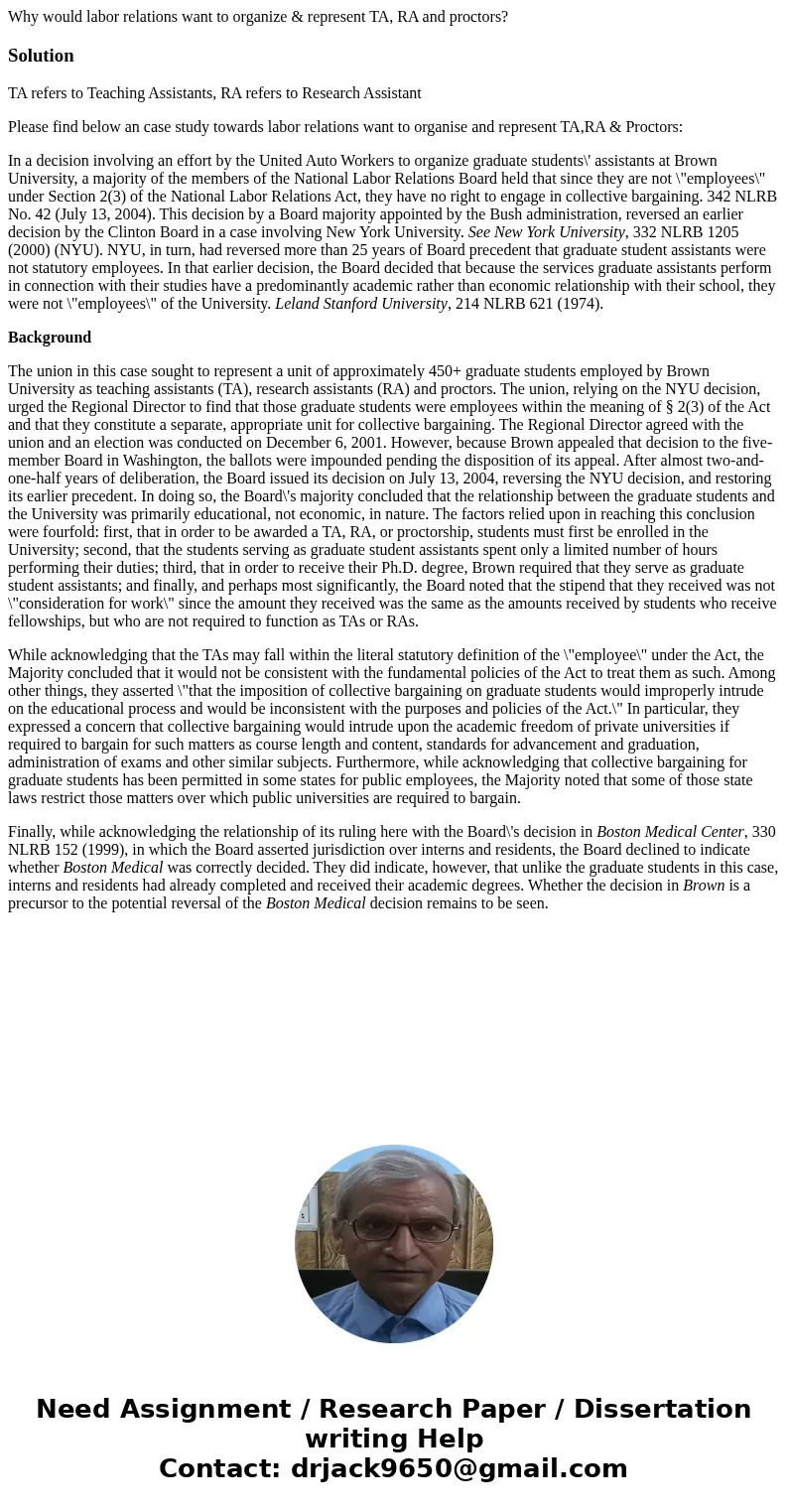Why would labor relations want to organize represent TA RA
Why would labor relations want to organize & represent TA, RA and proctors?
Solution
TA refers to Teaching Assistants, RA refers to Research Assistant
Please find below an case study towards labor relations want to organise and represent TA,RA & Proctors:
In a decision involving an effort by the United Auto Workers to organize graduate students\' assistants at Brown University, a majority of the members of the National Labor Relations Board held that since they are not \"employees\" under Section 2(3) of the National Labor Relations Act, they have no right to engage in collective bargaining. 342 NLRB No. 42 (July 13, 2004). This decision by a Board majority appointed by the Bush administration, reversed an earlier decision by the Clinton Board in a case involving New York University. See New York University, 332 NLRB 1205 (2000) (NYU). NYU, in turn, had reversed more than 25 years of Board precedent that graduate student assistants were not statutory employees. In that earlier decision, the Board decided that because the services graduate assistants perform in connection with their studies have a predominantly academic rather than economic relationship with their school, they were not \"employees\" of the University. Leland Stanford University, 214 NLRB 621 (1974).
Background
The union in this case sought to represent a unit of approximately 450+ graduate students employed by Brown University as teaching assistants (TA), research assistants (RA) and proctors. The union, relying on the NYU decision, urged the Regional Director to find that those graduate students were employees within the meaning of § 2(3) of the Act and that they constitute a separate, appropriate unit for collective bargaining. The Regional Director agreed with the union and an election was conducted on December 6, 2001. However, because Brown appealed that decision to the five-member Board in Washington, the ballots were impounded pending the disposition of its appeal. After almost two-and-one-half years of deliberation, the Board issued its decision on July 13, 2004, reversing the NYU decision, and restoring its earlier precedent. In doing so, the Board\'s majority concluded that the relationship between the graduate students and the University was primarily educational, not economic, in nature. The factors relied upon in reaching this conclusion were fourfold: first, that in order to be awarded a TA, RA, or proctorship, students must first be enrolled in the University; second, that the students serving as graduate student assistants spent only a limited number of hours performing their duties; third, that in order to receive their Ph.D. degree, Brown required that they serve as graduate student assistants; and finally, and perhaps most significantly, the Board noted that the stipend that they received was not \"consideration for work\" since the amount they received was the same as the amounts received by students who receive fellowships, but who are not required to function as TAs or RAs.
While acknowledging that the TAs may fall within the literal statutory definition of the \"employee\" under the Act, the Majority concluded that it would not be consistent with the fundamental policies of the Act to treat them as such. Among other things, they asserted \"that the imposition of collective bargaining on graduate students would improperly intrude on the educational process and would be inconsistent with the purposes and policies of the Act.\" In particular, they expressed a concern that collective bargaining would intrude upon the academic freedom of private universities if required to bargain for such matters as course length and content, standards for advancement and graduation, administration of exams and other similar subjects. Furthermore, while acknowledging that collective bargaining for graduate students has been permitted in some states for public employees, the Majority noted that some of those state laws restrict those matters over which public universities are required to bargain.
Finally, while acknowledging the relationship of its ruling here with the Board\'s decision in Boston Medical Center, 330 NLRB 152 (1999), in which the Board asserted jurisdiction over interns and residents, the Board declined to indicate whether Boston Medical was correctly decided. They did indicate, however, that unlike the graduate students in this case, interns and residents had already completed and received their academic degrees. Whether the decision in Brown is a precursor to the potential reversal of the Boston Medical decision remains to be seen.

 Homework Sourse
Homework Sourse